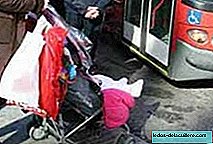
Most parents do not doubt the effectiveness of punishment to correct behaviors that we do not want our child to do, but also, a large number of them forget the importance of reinforcing positive behaviors.
In a given situation, children will repeat those that report personal satisfaction or a reward, demonstrating the importance of reinforcement in education and in the development of their behavior.
If we believe that good behavior consists in behaving well, in that it is a duty and an obligation of children, we are faced with a more than frequent mistake in which many parents fall.
By downplaying the achievements of our children, they end up focusing and defining their personality in relation to their mistakes and bad behaviors.
It is very easy to fall into the temptation to generalize the negative acts of children (of the type "never heed", "is always disobeying" ...) and label them ("you are bad" or "you are a mess", among many others). But this generalization of negative habits is not going to help us foster positive ones; Rather the complete opposite.
Children identify with the image they receive from themselves from their parents, because the personality formation responds to the need to define who we are
Being somehow, regardless of whether it is good or bad, offers them the security of knowing how they should behave. Therefore, it is convenient to appreciate each action independently and foster a personality that favors positive self-esteem.
How can we reinforce positive behavior?
Attention, displays of affection and praise are the best ways to reinforce positive behavior. In the same way, and occasionally, a material gift can be an effective resource to motivate and reinforce the desired behavior in children., But it is important not to abuse this resource so as not to make it a custom.
We must not forget the power of words, which together with affectionate gestures, are a great resource that will help us obtain effective results when we want a behavior to be performed more or less.
The fact that our children reach those behaviors that we want is a process that consists of small achievements that, once surpassed, bring them closer to the final objective. For example, if we want our child to remain seated while eating, we cannot pretend that he is sitting all the time at first. We will increase the time as he manages to remain more and more sitting (5 min, 10 min, 15 min ..., so until he is able to be all the food sitting)
In the same way, there will be more possibilities for success and for carrying out the expected behavior if reinforcement is present at all times and importance is also given to small steps. In the previous case, praise, gestures of affection or even material prize must be given to any progress (however minimal), and not wait to reach the final goal.
We must bear in mind that when the prize is given, it must be proportional to the achievement achieved and, although it seems insignificant and that it will not help, we must not stop giving congratulations or simple words of encouragement (“¡¡ how good you have done it! ”,“ you are a champion! ”…).
It happens that some parents, in a situation that overcomes them, may lose their roles or respond in an inappropriate way that, although it helps them to reestablish control immediately, is not benefiting the development of positive behavior habits. (We have already asked your opinion about it a few days ago)
Most of the time it happens because parents are not entirely clear what should be avoided so that a child stops performing a behavior that we don't like. Among those things that should not be done are, for example, threatening you with things, not explaining the reason for punishment and misconduct, educating you in fear, yelling or despising you, hitting you ...
Conclusion
Parents often take more into account how bad our son does in the face of behavior we don't like, forgetting the importance of reinforcing positive behaviors. This positive reinforcement must be subsequent and immediate to the action, since the delay decreases its effectiveness.
Likewise, it must be rewarded (in any way: with words, with a material gift, with gestures of affection ... that is, we must know what is the best reward for each moment) any effort or achievement of the child, however small . In addition, we should not end with a "but" a reward, because it is not a criticism of what our son has done.











